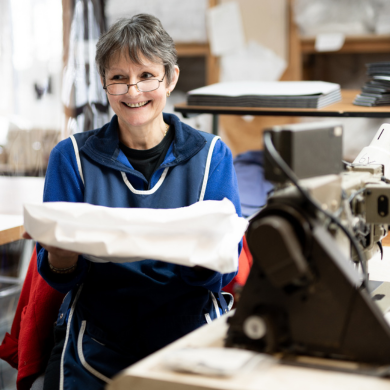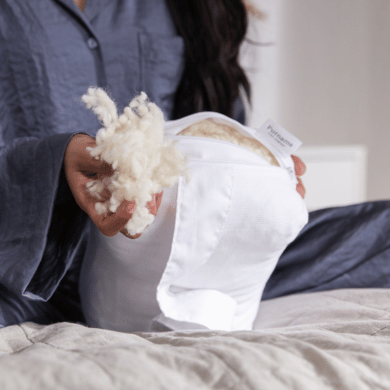
Les plastiques cachés dans votre literie : pourquoi la laine et le sarrasin sont une alternative écologique
Lorsqu'on pense à la literie, on privilégie généralement le confort, l'esthétique et le prix. Mais avez-vous déjà réfléchi à la composition des matériaux qui composent votre couette, vos oreillers ou votre surmatelas ? La literie synthétique traditionnelle peut contribuer à d'importants problèmes environnementaux et sanitaires.
Cet article explorera deux coupables cachés, les microplastiques et les COV (composés organiques volatils).
Nous présenterons des alternatives naturelles comme la laine britannique biologique et les coques de sarrasin biologiques comme des solutions parfaites pour les consommateurs soucieux de l'environnement.
Voir aussi - Vivre durablement avec Putnams : des produits écologiques pour une vie plus verte
Le problème de la literie synthétique
Microplastiques dans votre literie
La literie synthétique, fabriquée à partir de matériaux comme le polyester, la microfibre et les fibres creuses, contient des microplastiques qui non seulement nuisent à l'environnement, mais peuvent également présenter des risques pour la santé. Le polyester, par exemple, est dérivé du pétrole et du charbon, ce qui implique des procédés de fabrication énergivores.
Au fil du temps, de minuscules particules de plastique se détachent et s’infiltrent dans l’air, les systèmes d’eau et même dans les aliments que vous mangez.
Étonnamment, des études indiquent que les microfibres représentent jusqu'à 85 % des débris artificiels retrouvés le long des côtes du monde entier . Lorsque vous lavez votre literie synthétique, les microplastiques peuvent s'infiltrer dans nos réseaux d'eau, finissant par se retrouver dans les écosystèmes et même dans votre assiette.
Les COV et leur impact sur le sommeil
Si vous avez déjà acheté de la literie en mousse à mémoire de forme, vous connaissez probablement son odeur chimique au déballage. Cette odeur provient des COV (composés organiques volatils), des gaz chimiques libérés lors de la fabrication de matériaux synthétiques comme le polyuréthane. Au fil du temps, les COV se dégagent, ce qui peut affecter la santé respiratoire et contribuer à l'accumulation de toxines dans l'air que vous respirez.
La literie synthétique ne semble pas seulement inconfortable, elle peut avoir des répercussions à long terme sur l’environnement et la santé.
Heureusement, il existe une meilleure façon de dormir.
Voir aussi - Les avantages de la literie en laine pour un confort toute l'année
Saviez-vous?
Voici quelques statistiques actualisées sur les microplastiques :
- Exposition humaine : Les adultes ingèrent l'équivalent d'une carte de crédit en microplastiques chaque semaine par le biais de la nourriture, de l'eau et de l'air . (Stanford Medicine)
- Impact environnemental : On estime que 10 à 40 millions de tonnes de microplastiques sont rejetées dans l'environnement chaque année, et les projections suggèrent que ce chiffre pourrait doubler d'ici 2040. . (Le Guardian)
- Pollution des océans : Il y a actuellement entre 75 et 199 millions de tonnes de déchets plastiques dans les océans, et 33 milliards de livres supplémentaires pénètrent dans les environnements marins chaque année. . (RTS)
- Préoccupations sanitaires : Des microplastiques ont été détectés dans les tissus cérébraux humains, avec des concentrations en hausse de 50 % au cours des huit dernières années. Ils sont également présents dans le sang, le sperme, le lait maternel et le placenta. . (Médecine de Standford)
- Vie marine : Les baleines consomment jusqu'à 10 millions de morceaux de plastique par jour, ce qui équivaut à plusieurs tonnes de plastique pendant leur saison d'alimentation . (RTS)
Ces statistiques mettent en évidence la nature omniprésente des microplastiques et leur impact potentiel sur la santé humaine et l’environnement.
Voir aussi - Microplastiques : Sommes-nous confrontés à une nouvelle crise sanitaire – et que peut-on faire pour y remédier ?
L'alternative naturelle : la laine britannique et le sarrasin biologique
Pour les consommateurs soucieux de l'environnement qui cherchent à créer un environnement de sommeil durable et sans toxines, la réponse réside dans des matériaux naturels et biodégradables comme la laine britannique biologique durable et le sarrasin biologique.
Pourquoi choisir la laine biologique britannique ?
La laine biologique britannique est une ressource renouvelable et biodégradable qui offre un confort et une fonctionnalité inégalés. Récoltée sur des moutons paissant dans des pâturages luxuriants, sa production est bien moins émettrice de carbone que les matières synthétiques.
La laine possède d'excellentes propriétés isolantes : elle vous garde au chaud en hiver et au frais en été grâce à ses propriétés thermorégulatrices naturelles. De plus, son caractère hypoallergénique lui confère une résistance aux acariens, aux moisissures et aux allergènes souvent présents dans la literie synthétique.
La laine biologique britannique est non seulement douce pour votre peau, mais elle est également respectueuse de la planète, se décomposant naturellement sans laisser de microplastiques nocifs.
Les bienfaits du sarrasin biologique
Les cosses de sarrasin biologiques, souvent utilisées pour les oreillers et les surmatelas, sont une excellente option pour un sommeil sans toxines. Elles offrent un soutien et un contour naturels à la tête et au cou, ce qui les rend idéales pour favoriser l'alignement de la colonne vertébrale et améliorer la qualité du sommeil.
Les cosses de sarrasin sont totalement exemptes de produits chimiques et incroyablement respirantes, empêchant l'accumulation de chaleur pendant la nuit. De plus, durables et biodégradables, elles sont idéales pour les consommateurs soucieux de l'environnement qui ne souhaitent pas que leur literie finisse en décharge.
Voir aussi - Comment les oreillers en sarrasin restent hygiéniques et écologiques
Les solutions de Putnams pour les consommateurs soucieux de l'environnement
Si vous recherchez une literie aussi durable que luxueuse, ne cherchez pas plus loin que Putnams. Réputée pour son engagement envers des pratiques écologiques, Putnams propose des produits de literie haut de gamme à base de laine et de sarrasin, conçus pour répondre aux besoins de votre santé et de la planète.
Des couettes et oreillers en laine aux oreillers moelleux en sarrasin , chaque article est conçu pour offrir un confort naturel, sans microplastiques ni COV (composés organiques volatils) . Grâce à un approvisionnement durable et à des matériaux biodégradables, Putnams garantit un environnement de sommeil aussi propre et écologique que possible.
Voir aussi : Voici les meilleurs oreillers naturels du Royaume-Uni
Pourquoi choisir un sommeil plus écologique ?
En optant pour une litière à base de laine ou de sarrasin, vous réduisez votre empreinte carbone, éliminez l’exposition aux produits chimiques nocifs et soutenez des pratiques agricoles et de fabrication durables.
Vous n’investissez pas seulement dans un meilleur sommeil, mais aussi dans une planète plus saine.
Créez dès aujourd'hui un environnement de sommeil sans toxines
Prêt à passer à l'action ? Découvrez la gamme Putnams Collection Laine et Sarrasin et transformez votre havre de paix en un havre de paix écologique. Dormez mieux en sachant que vous avez un impact positif et conscient sur votre santé et l'environnement.
Il est temps de dire adieu aux plastiques cachés et de se tourner vers des alternatives naturelles, car le confort durable n'est plus un luxe ; c'est une nécessité.

















Laissez un commentaire